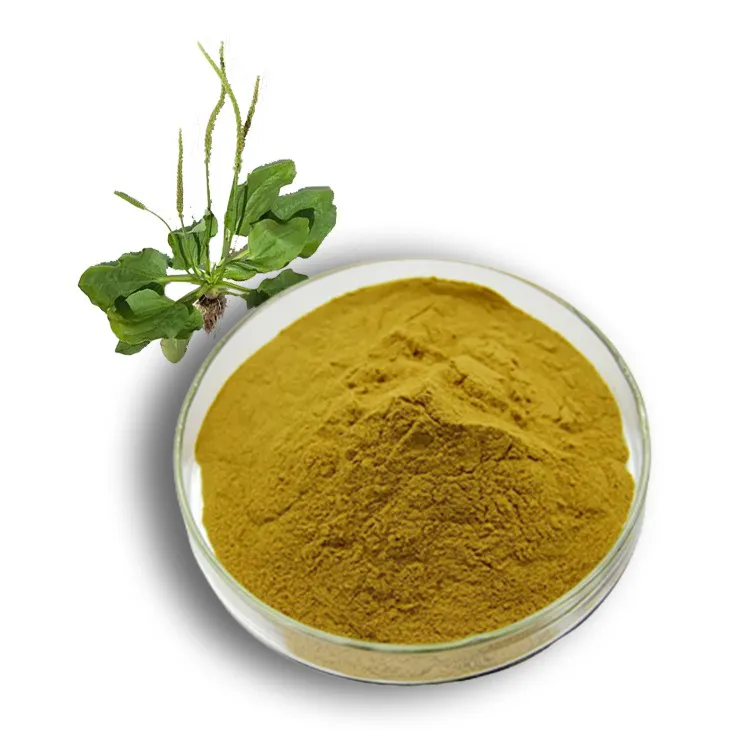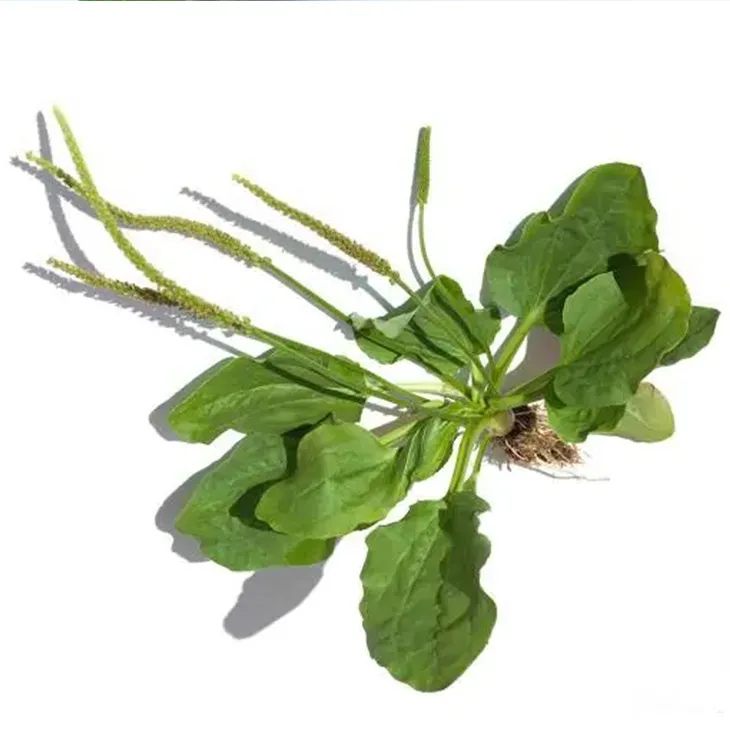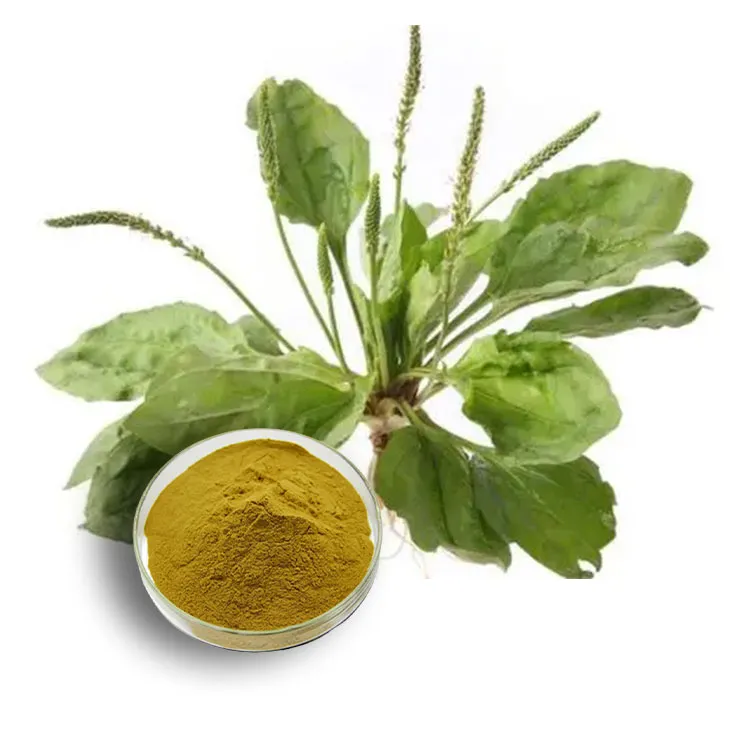- 0086-571-85302990
- sales@greenskybio.com
Our Guide to the Best Plantain Extract in the UK.
2024-12-11

Introduction to Plantain extract
Plantain extract has been gaining significant attention in the UK in recent years. It is derived from the plantain plant, which has a long history of use in traditional medicine. The extract is rich in various bioactive compounds that offer a plethora of potential health benefits. It is also finding its way into the cosmetics and food supplement industries, thanks to its unique properties.

Types of Plantain Plants Used for Extraction
Common Plantain (Plantago major)
The Common Plantain is one of the most widely used species for extraction. It is a hardy plant that can be found in a variety of habitats across the UK. It has broad, oval - shaped leaves and a long, slender flower spike. The leaves are rich in mucilage, flavonoids, and tannins, which are important components of the extract.
Ribwort Plantain (Plantago lanceolata)
Ribwort Plantain is another popular choice. It has lance - shaped leaves and a distinct ribbed texture. This plant contains iridoid glycosides, which are known for their anti - inflammatory properties. The extract from Ribwort Plantain is often used in herbal remedies for skin conditions and respiratory problems.

The Extraction Process
Harvesting
The first step in the extraction process is harvesting the plantain plants. This is typically done during the plant's growing season when the leaves are at their peak in terms of bioactive compound content. Harvesters need to be careful not to damage the plants during this process, as this could affect the quality of the extract. The plants are usually harvested in the early morning when the moisture content is highest.
Drying
After harvesting, the plantain plants are dried. This can be done in a number of ways, such as air - drying or using a low - temperature drying oven. Drying is important as it helps to preserve the plant material and concentrate the bioactive compounds. It also reduces the moisture content, which is crucial for the subsequent extraction steps.
Extraction Methods
- Solvent Extraction: This is one of the most common methods. Organic solvents such as ethanol or methanol are used to dissolve the bioactive compounds from the dried plant material. The solvent is then evaporated, leaving behind the concentrated Plantain extract. This method is effective in extracting a wide range of compounds, but it requires careful handling of the solvents to ensure safety and quality.
- Water Extraction: Water can also be used as a solvent. This method is more environmentally friendly, but it may not be as effective in extracting all the desired compounds. However, for some applications where a more natural extract is required, water extraction can be a good option. The plant material is soaked in water, and the extract is then filtered and concentrated.

Regulatory Standards for Plantain Extract in the UK
Herbal Medicine Regulations
If plantain extract is used in herbal medicine products, it must comply with the relevant herbal medicine regulations in the UK. These regulations ensure that the products are safe, effective, and of high quality. They cover aspects such as the identification and authentication of the plant source, the manufacturing process, and the labeling of the products. For example, the label must clearly state the ingredients, the recommended dosage, and any potential side effects.
Cosmetics Regulations
When used in cosmetics, plantain extract is subject to cosmetics regulations. These regulations are in place to protect consumers from any potential harm. They require that the extract is sourced from safe plants, and that the manufacturing process is carried out in a hygienic environment. The cosmetics containing plantain extract must also be properly labeled with ingredients and any relevant warnings.
Food Supplement Regulations
For plantain extract in food supplements, it has to meet the food supplement regulations. This includes requirements for the purity of the extract, the absence of contaminants, and proper labeling. The label should provide information about the nutritional content, the recommended intake, and any contraindications for certain groups of people.
Plantain Extract in Herbal Medicine
Traditional Uses
Plantain extract has a long history of traditional use in herbal medicine in the UK. It has been used to treat a variety of ailments, including skin wounds, insect bites, and respiratory infections. The mucilage in the extract is thought to have a soothing effect on inflamed tissues, while the flavonoids and tannins may have antibacterial and antioxidant properties.
Modern Research and Evidence
Modern research has been carried out to investigate the potential health benefits of plantain extract. Some studies have shown that it may have anti - inflammatory, antimicrobial, and immunomodulatory effects. For example, research on its use in treating skin conditions such as eczema has shown promising results. However, more research is still needed to fully understand the mechanisms of action and to establish its efficacy in different medical conditions.
Plantain Extract in Cosmetics
Benefits for the Skin
Plantain extract is becoming increasingly popular in cosmetics due to its beneficial effects on the skin. It can help to soothe irritated skin, reduce inflammation, and improve skin hydration. The anti - microbial properties of the extract also make it useful in products for acne - prone skin. It can be found in a variety of cosmetic products, such as creams, lotions, and serums.
Use in Different Cosmetic Formulations
- Moisturizing Creams: In moisturizing creams, plantain extract can enhance the skin's moisture - retaining ability. It works in combination with other ingredients such as glycerin and hyaluronic acid to provide long - lasting hydration.
- Anti - Aging Products: In anti - aging products, the antioxidant properties of the extract can help to protect the skin from free - radical damage. This can reduce the appearance of wrinkles and fine lines, and improve the overall texture of the skin.
- Soothing Lotions: For soothing lotions, the extract is used to calm and relieve irritated skin. It is often combined with ingredients like chamomile and aloe vera to enhance its soothing effect.
Plantain Extract in Food Supplements
Nutritional Value
Plantain extract contains a variety of nutrients and bioactive compounds that can contribute to its use in food supplements. It is a source of vitamins, such as vitamin C and some B - vitamins, as well as minerals like potassium and calcium. These nutrients are essential for maintaining good health, and the addition of plantain extract to food supplements can provide an extra boost.
Health - Promoting Effects
The bioactive compounds in plantain extract, such as flavonoids and iridoid glycosides, may have health - promoting effects. They can support the immune system, improve digestion, and help in maintaining normal blood sugar levels. However, it is important to note that food supplements should not be used as a substitute for a balanced diet, but rather as a complement.
Conclusion
Plantain extract in the UK is a versatile and promising product. With its various sources, extraction methods, and applications in herbal medicine, cosmetics, and food supplements, it offers a wide range of potential benefits. The regulatory standards in place ensure that consumers can have confidence in the quality and safety of products containing plantain extract. As research continues, we can expect to learn more about its properties and potential applications, further expanding its role in the UK's health and beauty industries.
FAQ:
What are the common types of plantain plants used for extraction in the UK?
In the UK, two common types of plantain plants are often used for extraction: Plantago major (Greater Plantain) and Plantago lanceolata (Ribwort Plantain). Plantago major has broad leaves and is known for its rich nutritional and medicinal properties. Plantago lanceolata, on the other hand, has lance - shaped leaves and also contains beneficial compounds. These plants are selected due to their prevalence in the UK's natural environment and their historical use in traditional medicine.
What is the typical extraction process for plantain extract?
The extraction process usually begins with the collection of fresh plantain plants. These plants are then carefully washed to remove any dirt or impurities. After that, they can be dried either in the sun or in a low - temperature drying facility. Once dried, the plants are ground into a fine powder. The extraction of the active compounds can be done through various methods. One common method is solvent extraction, where a suitable solvent like ethanol or water is used to dissolve the desired compounds from the powdered plantain. After extraction, the solvent is removed through evaporation, leaving behind the concentrated plantain extract.
How are the quality of plantain extract regulated in the UK?
In the UK, the quality of plantain extract is regulated through several means. The Food Standards Agency (FSA) sets guidelines for food - related products containing plantain extract. For herbal medicines, the Medicines and Healthcare products Regulatory Agency (MHRA) plays a crucial role. They ensure that the extraction processes are carried out in a hygienic and safe manner. Quality control tests are carried out to check for the presence of contaminants, the correct concentration of active ingredients, and the overall purity of the extract. Manufacturers are also required to follow Good Manufacturing Practice (GMP) standards to maintain consistency and quality.
What are the applications of plantain extract in herbal medicine?
Plantain extract has a variety of applications in herbal medicine. It is often used for its anti - inflammatory properties. It can be applied topically to soothe skin irritations, such as insect bites, rashes, and minor burns. Internally, it may be used to relieve digestive problems, including diarrhea and stomach cramps. Some herbalists also believe that it has expectorant properties, which can be helpful in treating coughs and bronchitis. The presence of certain bioactive compounds in plantain extract is thought to contribute to these medicinal effects.
How is plantain extract used in cosmetics?
In cosmetics, plantain extract is valued for its skin - nourishing and soothing properties. It can be found in products such as creams, lotions, and balms. The extract helps to moisturize the skin, making it softer and more supple. It also has antioxidant properties, which can protect the skin from damage caused by free radicals. Additionally, due to its anti - inflammatory nature, it can be beneficial for those with sensitive or irritated skin, reducing redness and inflammation.
Related literature
- The Medicinal and Nutritional Properties of Plantain Extracts in the UK"
- "Plantain Extraction Processes: A UK Perspective"
- "Regulatory Aspects of Plantain - Based Products in the UK"
- ▶ Hesperidin
- ▶ citrus bioflavonoids
- ▶ plant extract
- ▶ lycopene
- ▶ Diosmin
- ▶ Grape seed extract
- ▶ Sea buckthorn Juice Powder
- ▶ Beetroot powder
- ▶ Hops Extract
- ▶ Artichoke Extract
- ▶ Reishi mushroom extract
- ▶ Astaxanthin
- ▶ Green Tea Extract
- ▶ Curcumin Extract
- ▶ Horse Chestnut Extract
- ▶ Other Problems
- ▶ Boswellia Serrata Extract
- ▶ Resveratrol Extract
- ▶ Marigold Extract
- ▶ Grape Leaf Extract
- ▶ blog3
- ▶ blog4
- ▶ blog5
-
Pure 85% Tomentil Extract.
2024-12-11
-
Hawthorn Extract
2024-12-11
-
Aminolevulinic acid
2024-12-11
-
Pueraria Lobata Extract
2024-12-11
-
Polygonum Cuspidatum Extract
2024-12-11
-
Agaricus Blazei Extract
2024-12-11
-
Alfalfa Meal
2024-12-11
-
Hesperidin
2024-12-11
-
Acerola Extract
2024-12-11
-
Eyebright Extract
2024-12-11
-
Red Wine Extract
2024-12-11





















